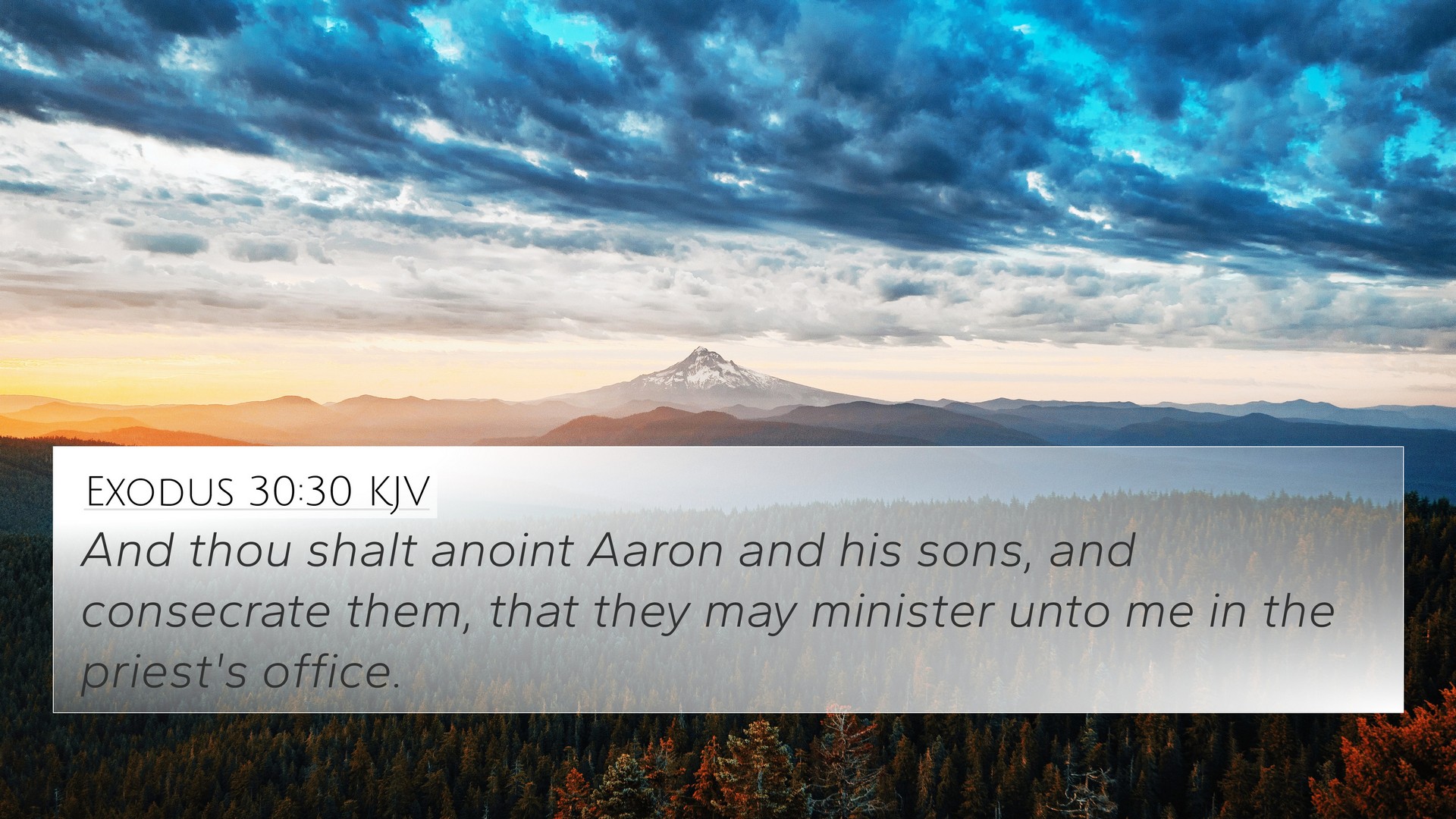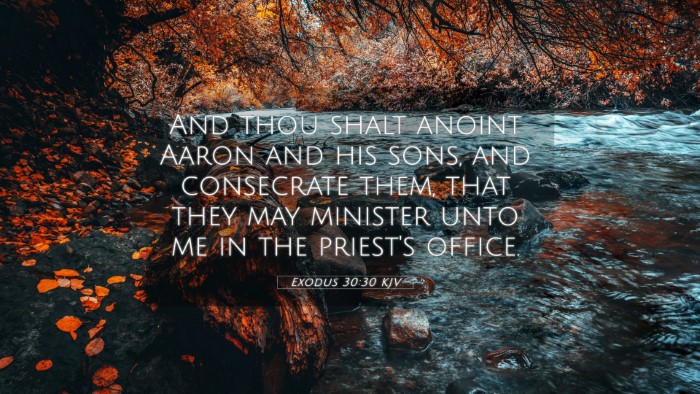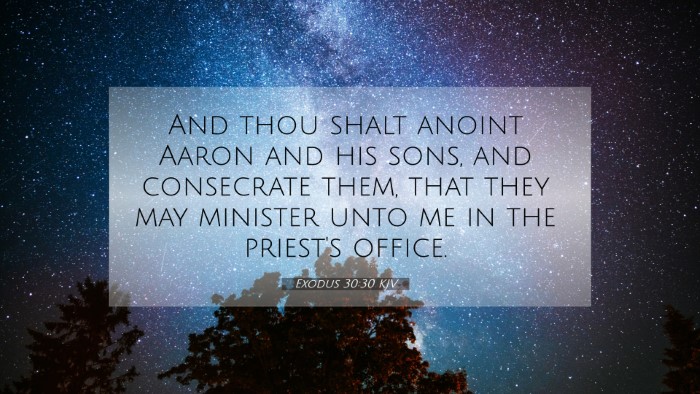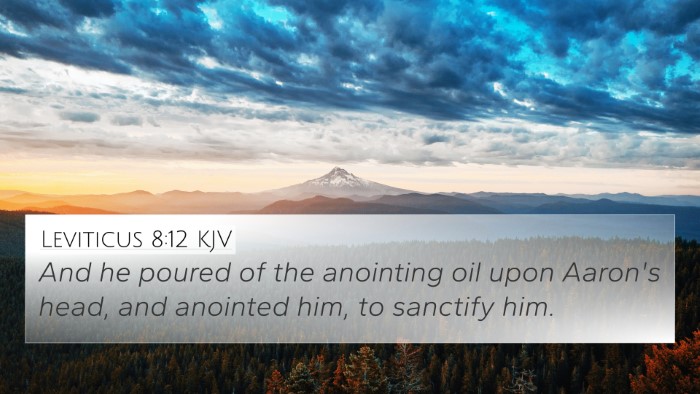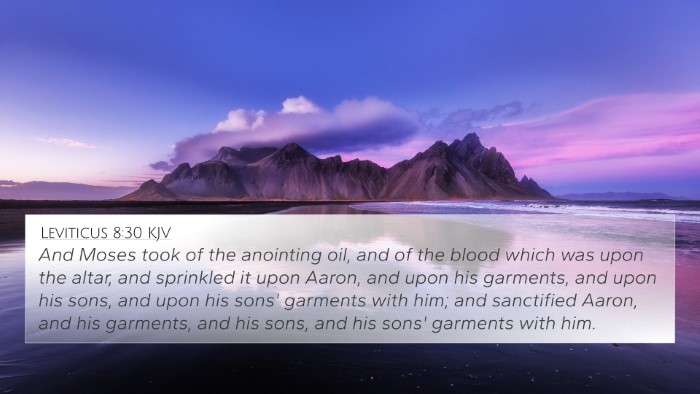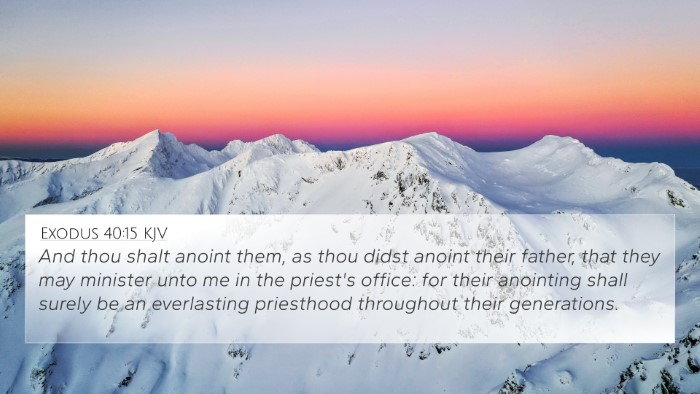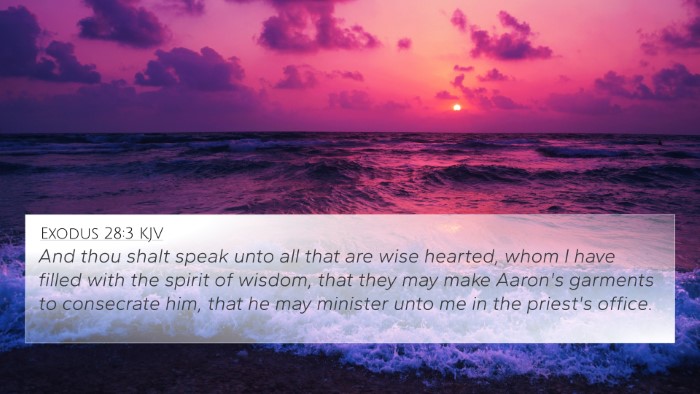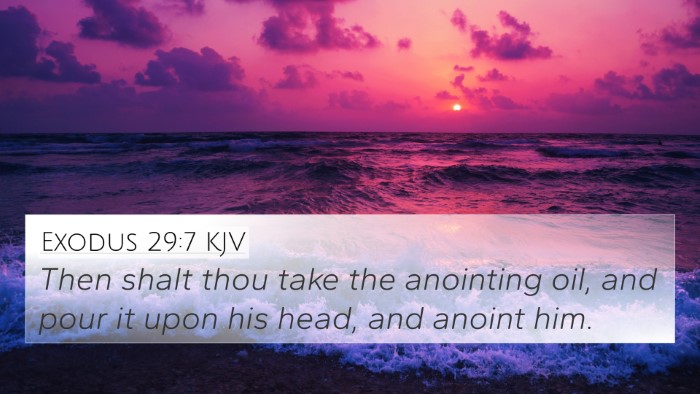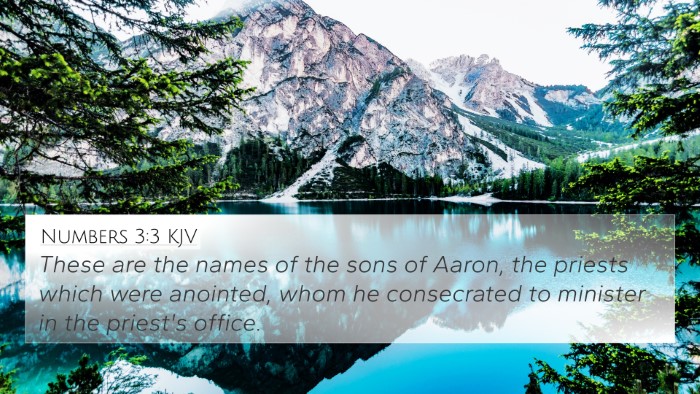Exodus 30:30 - Interpretation and Meaning
Bible Verse: Exodus 30:30 states, "And you shall anoint Aaron and his sons, and consecrate them, that they may minister to Me as priests." This verse emphasizes the importance of anointing and consecration in the establishment of the priesthood.
Summary of Insights
This passage is significant in the context of Israel's worship and the roles designated to the priests. It signifies the solemn act of setting apart individuals for a sacred duty, which is a recurring theme in biblical texts regarding service to God. The act of anointing is particularly notable, indicating divine selection and empowerment.
Historical Context
The context of Exodus 30:30 is situated within the directives given to Moses on the creation of the Tabernacle and the establishment of priestly duties. This marks a transformative moment for the Israelites, moving from slavery to a structured society governed by God's laws. The priests of Israel were responsible for conducting sacrificial offerings, maintaining the purity of worship, and leading the community in spiritual matters.
Commentary Insights
- Matthew Henry: Henry highlights the significance of anointing as a divine appointment and the seriousness of the priestly role. He notes that the anointing oil symbolizes the presence and consecration of God, marking the priest as set apart for His service, and underscores the importance of holiness in ministry.
- Albert Barnes: Barnes discusses the theological implications of priesthood and anointing, pointing out how priests were mediators between God and His people. He emphasizes that the consecration process through anointing was a reflection of divine authority and the need for the priests to maintain purity and dedication to their role.
- Adam Clarke: Clarke provides a detailed exploration of the anointing oil's ingredients, implying that the mixture signifies purity and perfection in the service to God. He connects this act to New Testament principles where believers are considered a 'royal priesthood' (1 Peter 2:9), drawing parallels between the Old and the New Testament themes of sacrificial service.
Bible Verse Cross-References
Exodus 30:30 can be cross-referenced with the following Scriptures:
- Leviticus 8:12: The anointing of Aaron as high priest reinforces the consecration process mentioned in Exodus 30:30.
- 1 Peter 2:9: The New Testament's reference to believers as 'a royal priesthood' echoes the themes of consecration and service present in Exodus.
- Hebrews 5:4-6: This passage speaks about the priesthood, specifically emphasizing that one does not take this honor upon himself, akin to Aaron's divine appointment.
- Exodus 28:41: Continuing the theme of consecration, it details the clothing of the priests and their anointing, reinforcing their holy status.
- Psalm 133:2: The preciousness of unity and the metaphor of anointing oil as a blessing can relate back to the sacrificial and unifying role of priests.
- Isaiah 61:1: This verse speaks of being anointed by the Spirit and applying the concept of priesthood to Christ, linking it back to the establishment of the roles in Exodus.
- John 17:19: Jesus speaks of sanctifying Himself for the sake of His disciples, portraying the priestly role of dedication and consecration.
Connections Between Bible Verses
Connections between Exodus 30:30 and other Scriptures help illuminate the nuanced understanding of priesthood and anointing throughout the Bible:
- Linking Bible scriptures: The theme of anointing as a divine selection surfaces numerous times, from the Old Testament with Saul and David to the New Testament with Christ's baptism by John the Baptist.
- Bible verses that relate to each other: The practice of anointing in both the Old and New Testaments emphasizes God’s continual framework of establishing leaders through His direct involvement.
- Cross-referencing Biblical texts: The anointing of priests ties to prophetic messages throughout the Prophets, illustrating the consistent importance of holiness and divine calling.
Thematic Bible Verse Connections
This verse elucidates several themes prevalent in Biblical theology:
- The nature of priesthood: Both the Old and New Testaments convey the idea of servants who mediate between God and humanity, underscoring the role of Jesus as eternal High Priest.
- The significance of anointing: Anointing is synonymous with divine empowerment and selection, as seen in the lives of numerous leaders throughout Scripture.
- Consecration: The theme of setting apart individuals for divine purposes resonates throughout the Biblical narrative, showcasing God's desire for holiness.
Inter-Biblical Dialogue
The inter-Biblical dialogue initiated by Exodus 30:30 shapes the understanding of the priestly role in various contexts. These conversations highlight how the concept of priesthood pivots around the act of anointing and divine purpose, affecting various teachings across the Scriptures.
Tools for Bible Cross-Referencing
For those studying Exodus 30:30, utilizing tools for Bible cross-referencing can enhance comprehension:
- Using a Bible concordance helps trace themes and words related to anointing and priesthood.
- A bible cross-reference guide can highlight related passages, enhancing thematic study.
- Employing cross-referencing Bible study methods allows for deeper engagement with the texts.
Final Thoughts
Exodus 30:30 stands as a testament to the divine orchestration of worship and service, foreshadowing the ultimate priesthood embodied in Christ. Understanding this verse through comparative analysis and cross-referencing unveils the multifaceted dimensions of service to God, cultivating a richer comprehension of biblical themes throughout both testaments.
